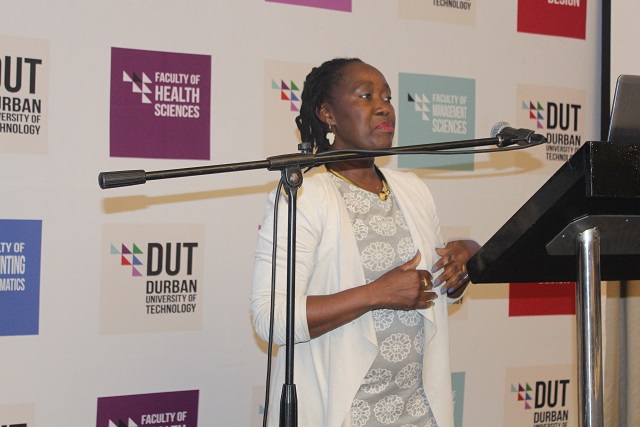The 2017 Extended Curriculum Programmes (ECP)/Foundation Colloquium took place at the Blue Waters hotel from 20 September 2017 to 21 September 2017.
The Durban University of Technology and Mangosuthu University of Technology partnered to bring together public universities in South Africa to engage on foundation provisioning imperatives. The two-day event was designed to ensure that the ECP community was stimulated by the presentations from fellow academics and practitioners across the South African Higher Education sector.
The colloquium organising team comprised of Shabnum Rambharos (DUT CELT), Sibongile Madi (DUT CELT), Neliswa Radebe (MUT), Edgar Samkange (MUT) and Cebo Nyondo (MUT).
Various presentations on topics ranging from developing new strategies to integrate HIV/AIDS, evaluation of teaching in foundation provisioning, tackling a new text and positioning the self, were just some of the topics of discussion at the colloquium.
Delivering the keynote address on day one was Director: Department of Student Affairs at the University of Pretoria, Dr Matete Madiba, who spoke about the new policy directions for foundation provisioning within Ministerial approved extended curriculum programmes.
“The main purpose of foundation provision is to improve the academic performance of those first-time entering undergraduate students, who already comply with the minimum requirements to enroll for a particular University qualification, and who have already enrolled for that qualification, but who are at risk of failing or dropping out,” she said.
She further added that it was for universities to carefully design foundation provision plans in order to continue to receive funding for foundation students in two ways: through the teaching input subsidy within teaching input sub-block grant, and through the distribution of earmarked state funds for foundation purposes.
DUT’s Andrea Alcock, also presented a thought-provoking topic on day one, giving her input on: Positioning the self: the first generation extended curriculum students’ academic identities at a time of transition. The theme of her paper was drawn from a broader social psychology comparative study of the self-positioning of seven first-generation students in an extended curriculum programme at DUT. “A visual methodology inspired by Photovoice was used to generate data during photo-elicitation interviews.
For these interviews, participants took metaphoric and non-mimetic photographs in response to the prompt,” she said. Alcock added that the participants experienced the university as a powerful institution in both a positive and negative light whereby both opportunity and alienation were acknowledged in the student experience. Her study revealed to the audience that in spite of the power of an institution the participants were able to form strong academic identities and calls for the University, to acknowledge and respond to such shifts in identity by creating the kinds of teaching and learning interventions that validate and affirm students’ transitional experiences, were made.
On day two saw keynote speaker, Professor James Garraway from the Fundani Centre for Higher Education’s foundational provision unit at CPUT, talk on what is an effective ECP practice?
Professor Garraway revealed that according to the National Benchmark Tests (NBT) which assesses how ready pupils are for tertiary studies in South Africa, indicated that most first years would struggle with the reading, writing, arithmetic and mathematical challenges of the specialist fields of University study. “We can surmise the problem of transition is a fairly common situation across all UoTs. Foundational provisions are purpose-built to help students transition and navigate into these specialized discourses. However, the question needs to be asked, even 10 years on, as to whether we have effective means for enabling these complex transitions,” he said.
His further research has found that it was important for participatory parity in the teaching and learning environment, in which students’ voices needed to be heard and respected and be provided with opportunities to experiment with new ways of thinking.
All in all, the two-day colloquium was a great success and the general consensus from the academic delegates were that such events helped universities to critically reflect on the foundational provision. Also, there were many contentious issues and studies that were discussed as well as innovative and transformative teaching and learning practices, which were well-received.
Pictured: Director: Department of Student Affairs at the University of Pretoria, Dr Matete Madiba, speaking about the new policy directions for foundation provisioning within Ministerial approved extended curriculum programmes.
Waheeda Peters


